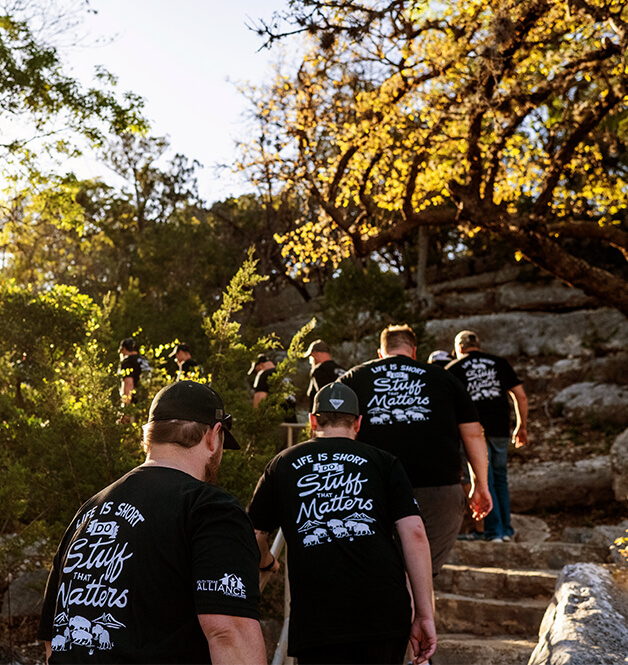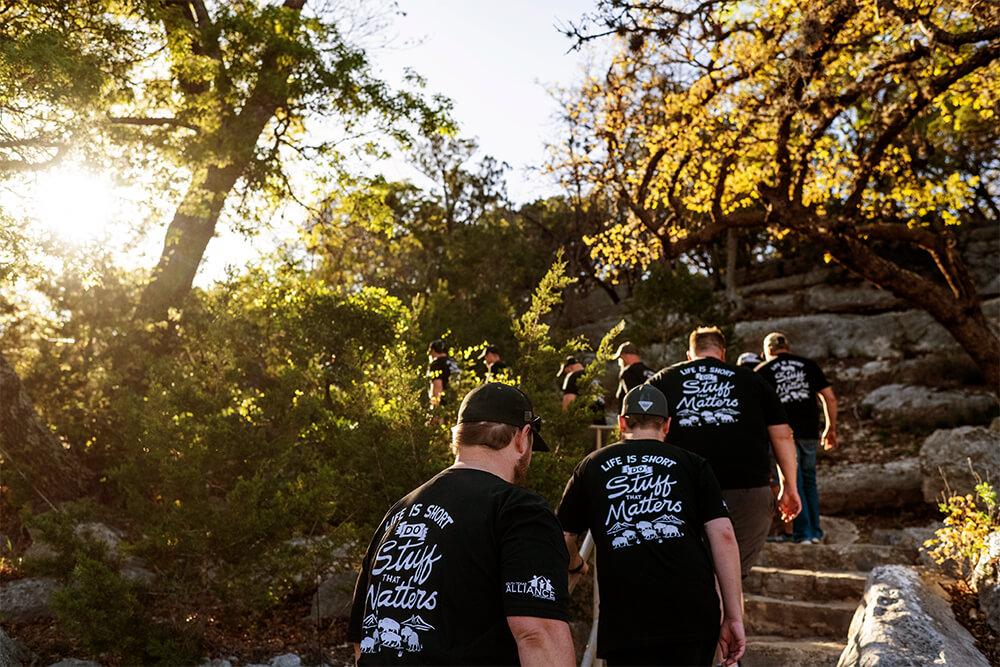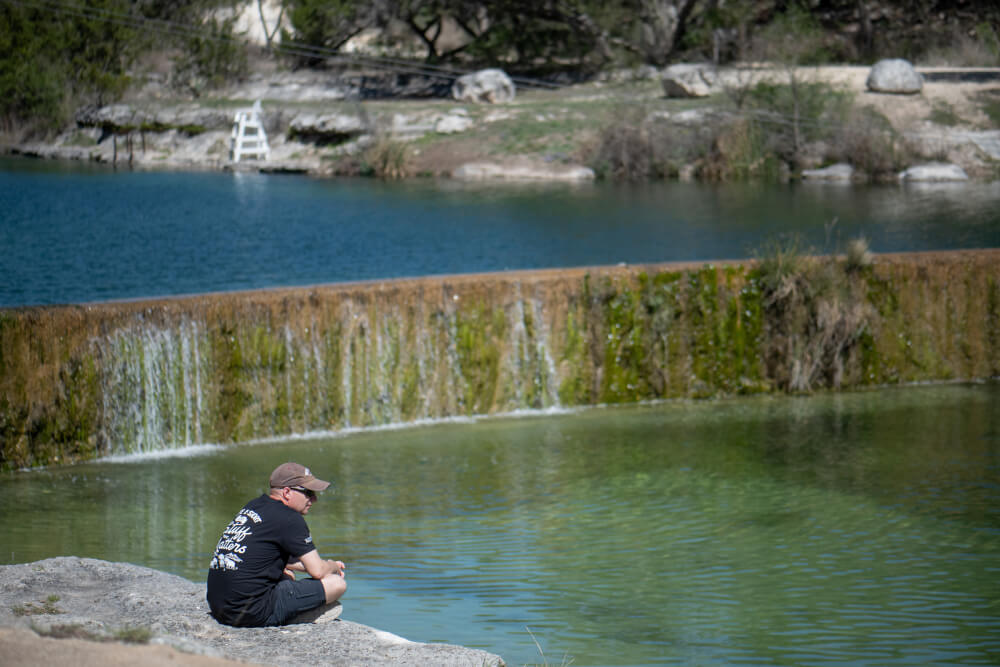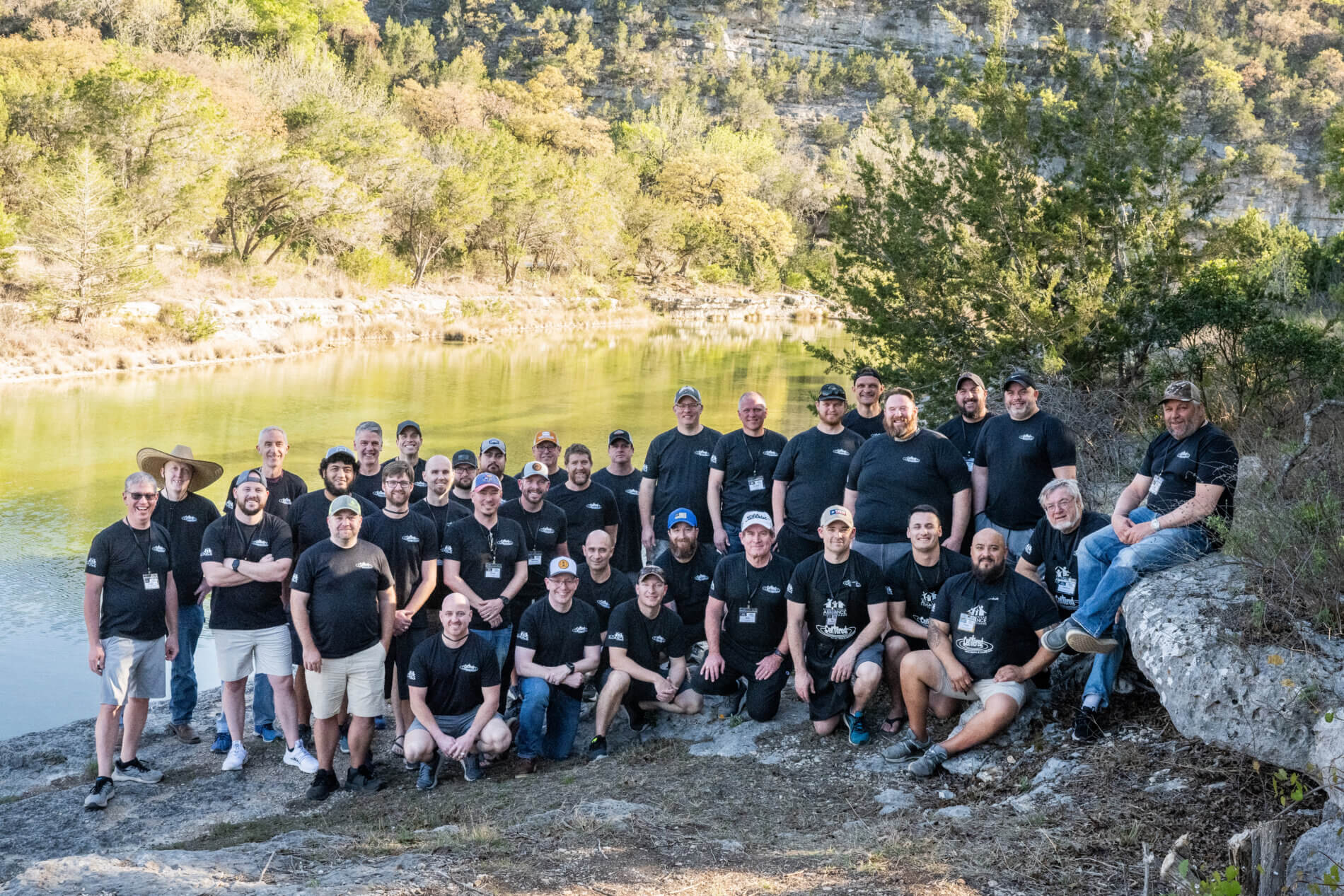

Jacob Wilkins and his family have fostered seven children.
Typically, the process looks like this: they get a call about kids needing a home, they provide a way station, and then the kids find permanent placement. Ideally, children return to their birth parents, but in reality, that outcome is rare.
Wilkins has only seen it happen once in seven foster experiences, and even then, the process was complicated.
“The one time we had a child go back to mom and dad, they were doing everything right,” Wilkins shared. And yet, even those birth parents struggled to earn the confidence of the court system.
Jacob Wilkins was telling this story to other foster and adoptive dads this spring at CenTered, a retreat led by the South Texas Alliance for Orphans and hosted at Singing Hills through the H. E. Butt Foundation Camp. Wilkins’ family has been fostering children since 2018, and it was his second time to attend the retreat.
Wilkins explained that because that particular foster case lasted over a year, the Wilkins family and the birth family developed a good rapport. In fact, that particular experience was as much about supporting the parents as the child because the reunification timeline kept changing. The case worker would tell the birth parents that everything would be settled in about a month, but then it would take longer.
“We were worried they were going to relapse because it seemed like false hope,” Wilkins said. “So we had to encourage the parents.” In the end, despite the anguish of those final months, the child went home, and the family was restored. The two families still keep in touch.
“Sometimes the mom sends us pictures, and they are still doing really well,” he said.
| “It was great to meet more men that are going through or have been through the struggles we are facing with foster kids. We were able to share, be candid and discuss the problems and triumphs without judgment, only encouragement.” — 2022 ATTENDEE |
|---|
In 2015, U. S. District Judge Janis Graham Jack declared that “Texas’ foster care system is broken, and it has been that way for decades.” At the time, the Department of Family Protective Services (DFPS) had an annual budget of $1.6 billion, with more than half of that funded by the federal government.
By 2023, the department’s allocated budget increased to $4.58 billion.
This is by far the largest department of its kind in the U. S., which is fitting given the state’s population: over 10% of all children in the country live in Texas.
The infusion of funds seems to be slowly having an impact, but many people who spoke to me said the state is still in crisis mode.
“Everybody is tired,” said one Bexar County CPS worker. “Last night I worked an over-night shift, then had to get up and do my regular job. If you see me with bags under my eyes, it’s because I worked last night.”
Forty-five percent of foster kids in Bexar County are placed outside the county, far from their families of origin. That statistic comes from Jennifer Smith, the founder and executive director of the South Texas Alliance for Orphans.
Having worked in foster, adoptive, and kinship care herself since 2009, Smith eventually started a foster and adoptive ministry at Grace Point Church in San Antonio. In 2018, First Presbyterian Church of San Antonio provided funding for them to become an independent 501(c)3 with six churches in the Alliance.
Today, 89 churches support children and families through programs like CenTered, the Foundation Camp retreat for foster and adoptive dads.
“God cares about kids,” Smith told me. It’s her mantra, and rightly so. Dozens of verses call Christians to care for orphans and the fatherless. “It’s a black eye to the church that we have this many kids languishing in foster care.”
| “It was good to be reminded that we can be still and rest in God’s provision for us, even in the midst of what sometimes feels like an overwhelming battle for our kids.” — 2023 ATTENDEE |
|---|
The South Texas Alliance for Orphans has a three-tiered approach to the crisis in Texas. Thrive in community, grow the crowd, and build the core. Smith calls them the three Cs.
First, the church “thrives in community” when Christians actively serve those outside the church. They help with the Kinmart school supply initiative and the JingleMart Christmas initiative. They connect their church to the CarePortal, which the alliance has sponsored since last year. They also support caseworkers and do what they can to make the job easier.
“Churches will adopt a unit of caseworkers, 30-60 people,” Smith said, “and they’ll fill their lunchroom with goodies.” They’ll also make caseworker kits for when they go to houses to pick up kids. “A lot of times the caseworkers are buying kids food, and they don’t have a budget for that.”
Second, the church “grows the crowd” of people serving foster children and orphans when they help Christians understand the scope of the challenge facing Texas children. Smith does this by speaking at churches all the time—in fact, H. E. Butt Foundation President David Rogers learned about the South Alliance for Orphans when Smith spoke at his own church this spring.
Finally, the church “builds the core” when they identify and support foster families directly. Smith hopes the alliance can help more families avoid burnout—and that was the direct goal of the recent CenTered retreat along the Frio River.
With the kind of support and encouragement nurtured at such a retreat, people like the Wilkins family are more likely to stay engaged, fostering a second, third, or even seventh child, bringing more expertise and strength to each subsequent relationship.
| “God really pressed in on me that I need to trust the process and trust him. With our oldest girl in a long-term psych treatment center, it’s been hard to not demand results. This weekend helped serve as a reminder that God is good …” — 2023 ATTENDEE |
|---|

The weekend at Foundation Camp certainly encouraged Jacob Wilkins. He enjoyed studying the Bible with the other foster dads and discussing Psalm 46 together: “Be still and know that I am God.” Pause and reflect. Thirty-five foster dads did just that—along with basketball, cornhole, fly fishing, a BBQ smoker like an 19th century steam train, lots of sharing, and lots of laughter.
“I left refreshed, encouraged, and honored,” one father said in a survey after the retreat. “There is power in being able to share your struggles as a dad and husband with people who get it,” another said. These foster dads and kinship dads, along with foster dads-to-be, needed the down time and the support.
On these retreats “the guys talk to each other and pray for each other,” Wilkins said. “God opens doors.”
When those doors open for dads, they open for families, too.
After last year’s retreat, a spouse wrote to the leaders of the retreat about the change she saw in her partner. “I just wanted to let you know that your retreat was hugely beneficial for my husband,” she wrote. “He was at a point where he was really questioning his faith after a very heavy year, but he was like a new person coming home yesterday. So encouraged and refreshed.
“We talked about his experience, conversations he had with other guys, and your devotions for a couple hours last night, and it was beautiful to see.”
And as one dad put it after this year’s retreat: “I was … speeding most of the way there in anticipation. However, when I left, I couldn’t even get my car up to the speed limit. I didn’t want to leave this space or experience, and I was mulling over all that had happened that weekend. I didn’t want to forget anything.”

| For more information about foster care, South Texas Alliance for Orphans, or how to get your church involved with their work: VISIT ALLIANCE4ORPHANS.ORG |
|---|
Grace Northridge Pastor Brit Carpenter has experienced first-hand, friendships across community divides.
A conversation in the Great Hall stuck with Mark Roberts for over a decade, and now it is one of the guiding principles of his work at Fuller Seminary's Max DePree Center.